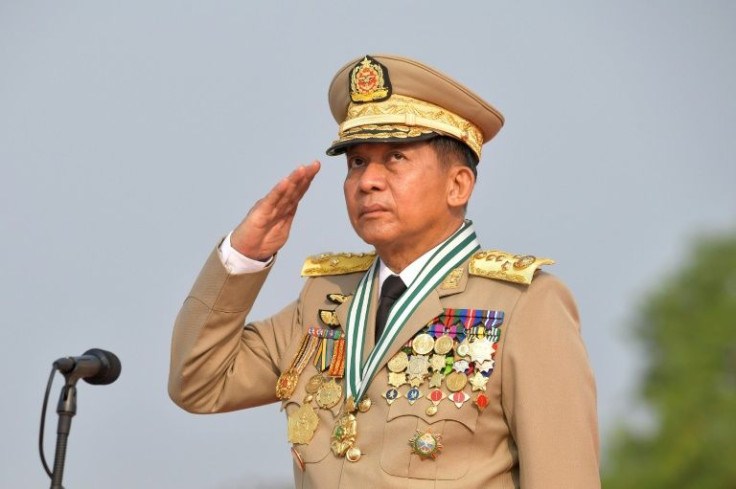Is Junta Deliberately Turning Myanmar Into A Closed Economy?

When Myanmar's junta staged the coup d'état on Feb. 1, 2021, the southeast Asian nation's currency kyat's value against the U.S. dollar stood at 1,340. However, when the military and its ethnic opponents observed July 19 as the 75th anniversary of the assassination of independence hero and father of the ousted leader Aung San Suu Kyi, kyat was selling at 2,400 per dollar.
Kyat lost a third of its value against the dollar in 2021 after the freeze on the nation's foreign reserves held in the U.S. and suspension of multilateral aid - a key source of foreign currency -- due to the February coup and the subsequent crackdown.
With the plunge in the value of the currency, food and fuel prices have gone through the roof in the embattled nation.
Due to the twin shocks of the pandemic and the coup, more than 1.1 million people were unemployed compared with 2020. The World Bank has predicted that the country's economy will post 3 percent growth this year, after shrinking 18 percent in 2021.
In a report released in July, the World Bank said Myanmar's economy remains fragile due to the dollar shortage which limited the availability of imported products.
Since April, the junta, which toppled the civilian government of Nobel Laureate Aung San Suu Kyi, has been making efforts to shore up the dwindling foreign currency. As part of this, imports of cars and luxury goods have been banned.
Moreover, the regime has limited imports of fuel, cooking oil, and pharmaceuticals to prevent the outflow of dollars.
In July, the Central Bank of Myanmar (CBM) directed companies with outstanding foreign loans to skip the disbursement of debts. Companies in Myanmar owe at least $1.2 billion in outstanding dollar-denominated loans, according to Bloomberg.
The borrowers include telecom firm Ooredoo Myanmar, City Square Commercial, a real estate firm, and telecom tower companies Apollo Towers Myanmar and Irrawaddy Green Towers.
To shield the local currency from volatility, foreign exchange earners are asked by the military to convert their currencies into kyat at the reference rate of 1,850 to a dollar, set in April by the CBM.
While companies have to convert their U.S. dollar earnings to kyats at 1,850 kyats per dollar, they have to pay more than 2,000 kyats per dollar when they buy greenbacks.
Business owners said the CBM's capricious directive has made it difficult for them to operate in the country, as they have little time to prepare or adapt to the new regime.
Many foreign firms have already ended their operations in Myanmar amid international pressure. Global automobile majors, including Japan's Suzuki and Korea's Hyundai, have halted production and Australia's Woodside Petroleum has joined oil majors like Chevron and Total in announcing exit plans.
Japanese drinks company Kirin Holdings has decided to sell its stake in a Myanmar joint venture with a military-linked local partner, the company said June 30.
It appears that many more firms will be likely to follow suit. Instability, uncertainty, and sanctions led to a corporate retreat from Myanmar.
As the regime is desperate to preserve the country's declining foreign currency reserves, the junta has stopped the use of yuan and Thai baht for trade along the borders with China and Thailand. It wanted all transactions to be conducted in dollars through banks.
Currently, the junta cannot secure loans from the World Bank, ADB (Asian Development Bank) and JICA (Japan's development agency) and the exemption period to pay back loans due to the pandemic will end soon. So, the junta is bent on controlling the U.S. dollars.
But the Southeast Asian nation has sufficient foreign reserves to avert an economic crisis similar to Sri Lanka's, Major Gen. Zaw Min Tun, a spokesman for the State Administration Council, said on July 25.
Myanmar has a fair share of foreign-currency reserves like the U.S. dollar and Chinese yuan, Major Tun added, without divulging details.
Myanmar has managed to secure $3.8 billion in foreign investment since the coup. Though the military did not give details of the investments, the projects approved included $2.5 billion in a liquefied natural gas power plant.
China is the top investor, it said, without disclosing the figures. A Japanese firm committed $516.4, a combined $442.2 million from four Singaporean firms, $75.5 million from two Thai ventures, and $66.1 million from five Korean firms, the military said.
The regime is keen on using dollars to fund its military expenditures as it struggles to contain nationwide resistance. With its ground forces making poor moves, the junta has to rely on aerial attacks in its fight against armed ethnic organizations.
The military, which is committed to holding national elections in the second half of 2023, continues its crackdown on pro-democracy activists, killing over 2,000 people. Despite calls for clemency from international quarters, the junta executed four activists, including hip-hop star turned MP Phyo Zeya Thaw on July 25.
Is the junta, which has directly ruled Myanmar for decades except for the last 10 years, creating an economic crisis intentionally? So that an economy closed to the outside world can help it monopolize forever.





